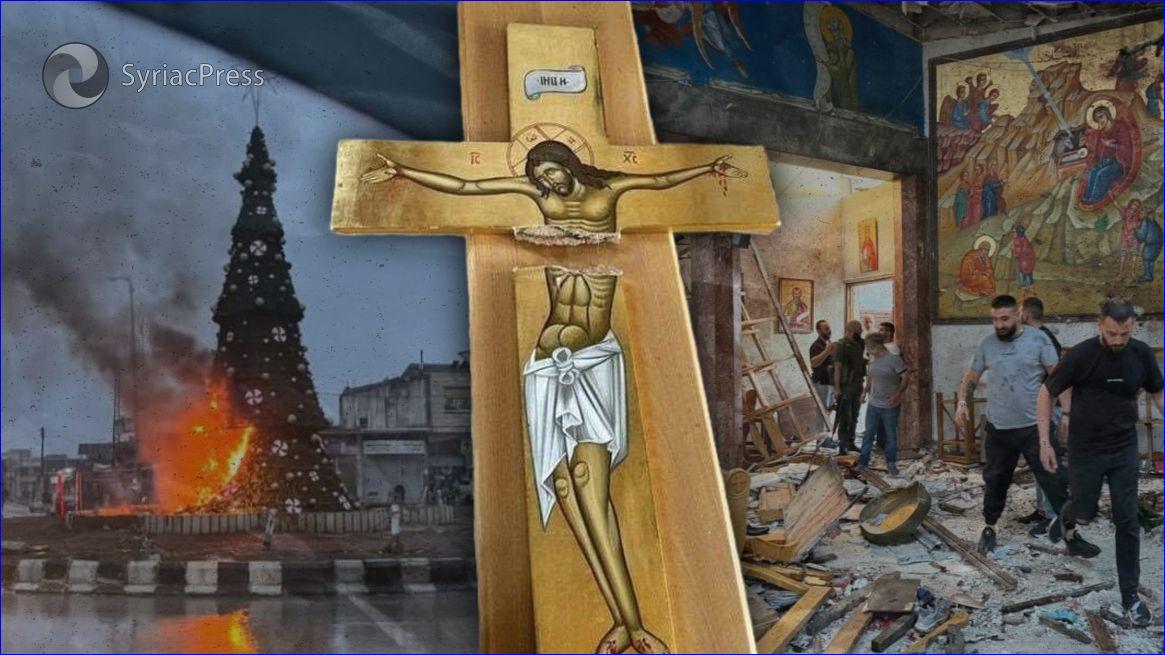


According to the SSRC, the political upheaval that followed the regime's collapse left large parts of Syria fragmented among armed factions, creating a power vacuum that emboldened extremist groups and allowed sectarian violence to spread. The report describes a "climate of fear and impunity" in which attacks on churches, cemeteries, and Christian homes have become frequent, and where education and security institutions have begun to adopt discriminatory policies.
According to the report, churches and cemeteries have been repeatedly vandalized, crosses destroyed, and Christmas trees set on fire in several cities. The SSRC noted that in December 2024, gunmen attacked the Greek (Rûm) Orthodox Archdiocese in Hemto (Hama), desecrated a cemetery, and destroyed religious icons. Around the same time, armed groups entered Christian districts of Holeb (Aleppo), forcing residents to comply with religious dress codes and segregate men and women in public spaces. Videos of militants burning crosses and denouncing Christians were widely shared on social media.
The report also documented the suicide bombing targeting the Mar Elias Church in Daramsuq (Damascus) on 22 June 2025, which claimed the lives of 29 worshippers and wounded 60 others. The attack, attributed by the government to the Islamic State (ISIS), is described as "a devastating blow to one of the few remaining active Christian congregations in the capital." Additional incidents include assassinations along the Latakia highway, kidnappings in Hmoth (Homs) province, and a series of arson attacks that forced families to flee from long-established Christian neighborhoods.
While the perpetrators often remain unidentified, the SRRC says evidence points to a mix of jihadist cells, opportunistic militias, and local authorities. Some groups, such as Hayat Tahrir al-Sham (HTS), now the de facto government of Syria, reportedly issued apologies or paid compensation after incidents, but the absence of transparent investigations or judicial accountability has left survivors without justice. "Impunity has become the rule, not the exception," the report states.
Beyond physical violence, the report highlights administrative and cultural pressures. It notes sweeping education reforms introduced in January 2025 that, according to community leaders, infuse religious language into public school curricula and marginalize Christian history and culture. Local Church figures interviewed by the SSRC said the new textbooks "risk institutionalizing discrimination and eroding the pluralistic identity of Syria."
The report details other forms of coercion, including the confiscation of homes and shops belonging to displaced Christians, the imposition of "taxes" or tributes by armed factions, and threats that forced families to abandon property. Leaflets calling for violence against Christians were found in multiple towns, and some security branches reportedly participated in arbitrary arrests or intimidation campaigns.
The SSRC concludes with a set of urgent recommendations directed at the United Nations, international NGOs, and regional actors. It calls for independent investigations into all documented violations, protection of churches and religious sites, emergency aid for displaced families, and sanctions on groups involved in sectarian attacks. The SSRC also urges reforms to reverse discriminatory education policies and to uphold constitutional guarantees of religious freedom.
The organization links the rise in sectarian incidents to the political vacuum left by the regime's collapse in December 2024, which it says allowed local armed groups to consolidate control and impose ideological agendas in previously mixed areas. "For Christian communities already diminished by years of conflict, the current escalation threatens their very survival," the report warns.
Human rights organizations have repeatedly called for mechanisms to monitor violence against religious minorities in Syria, but the SSRC's latest findings suggest that conditions have deteriorated sharply in 2025. The report closed with a stark appeal: "Without swift and coordinated international intervention, Syria risks losing one of its oldest and most integral communities."

or register to post a comment.